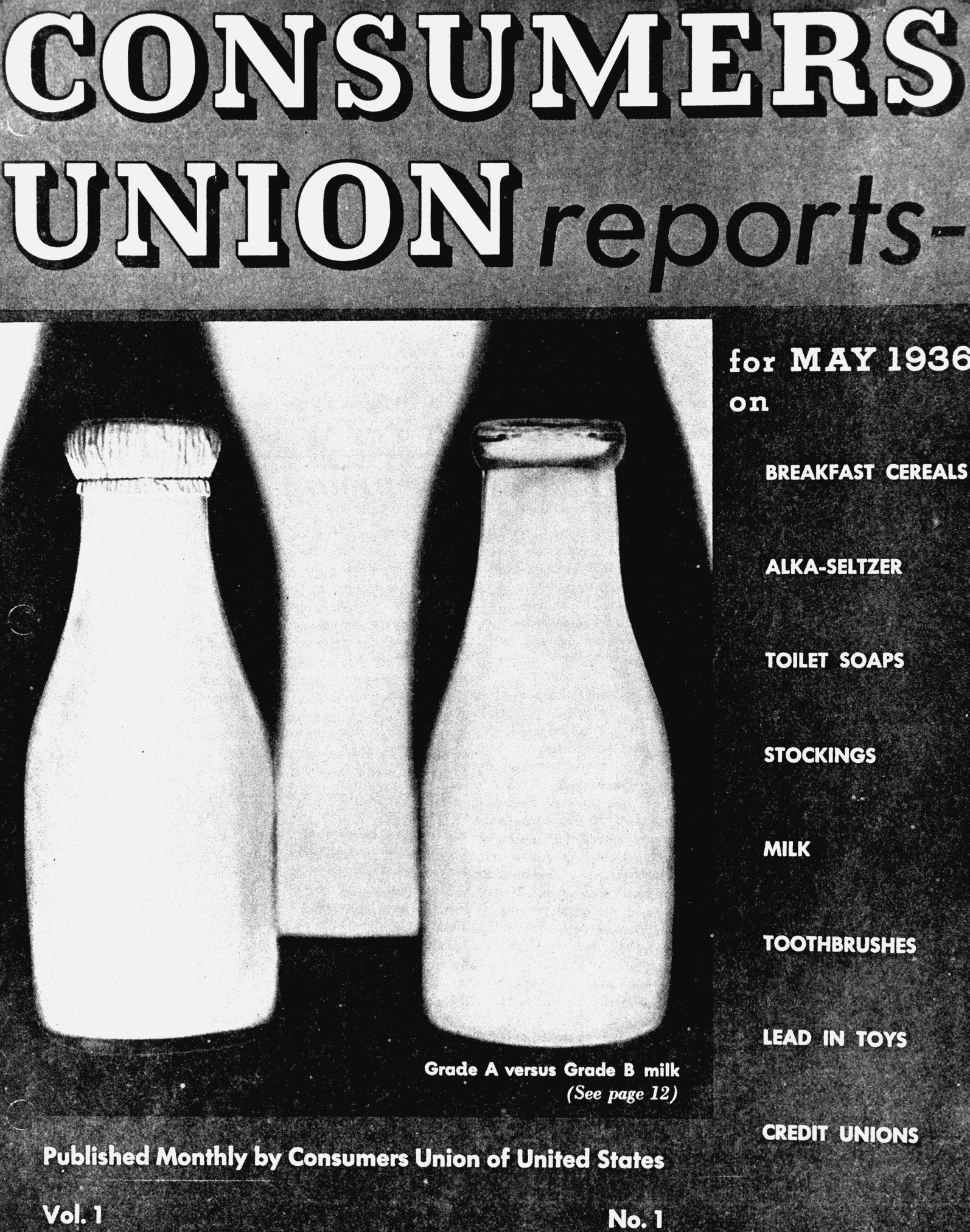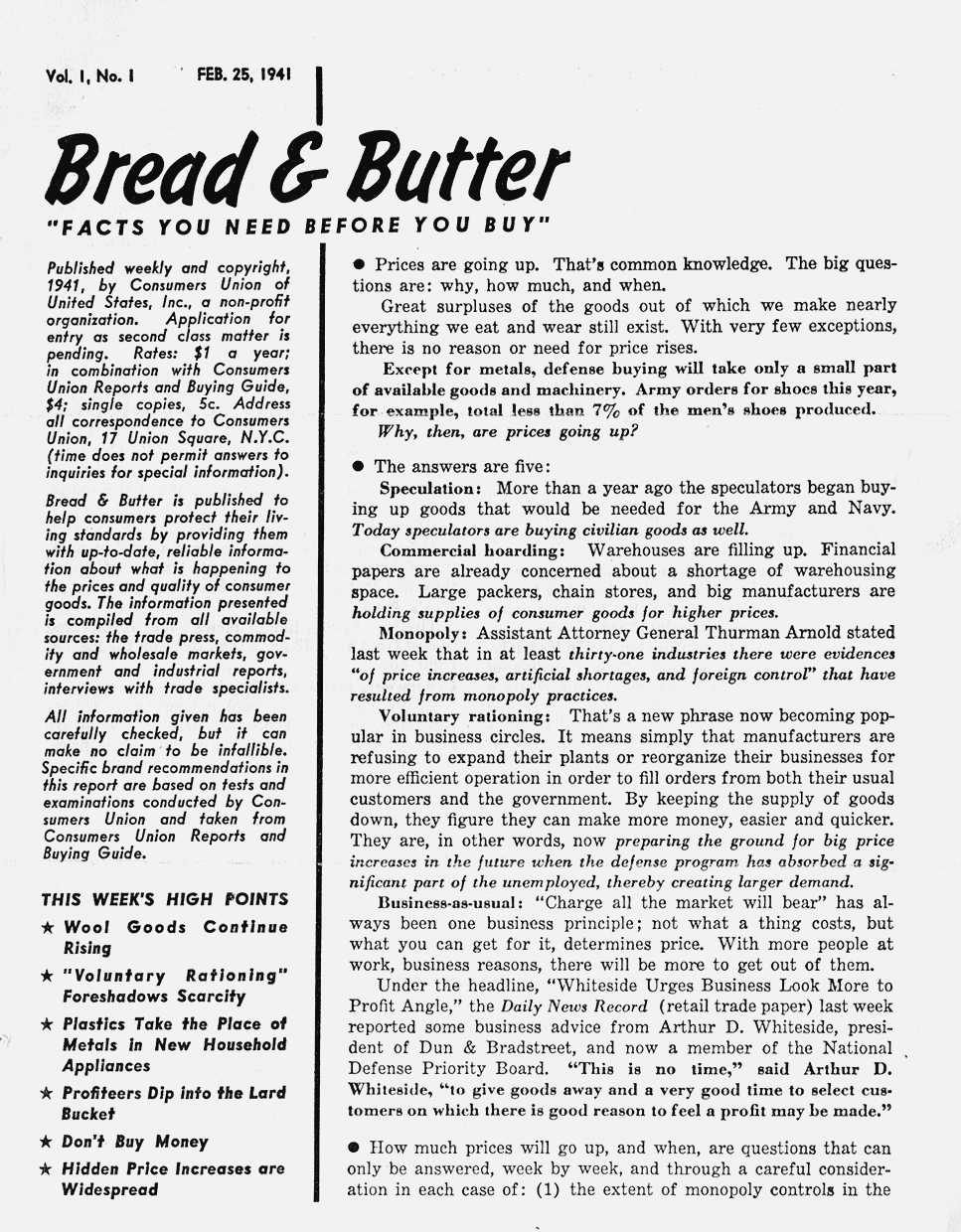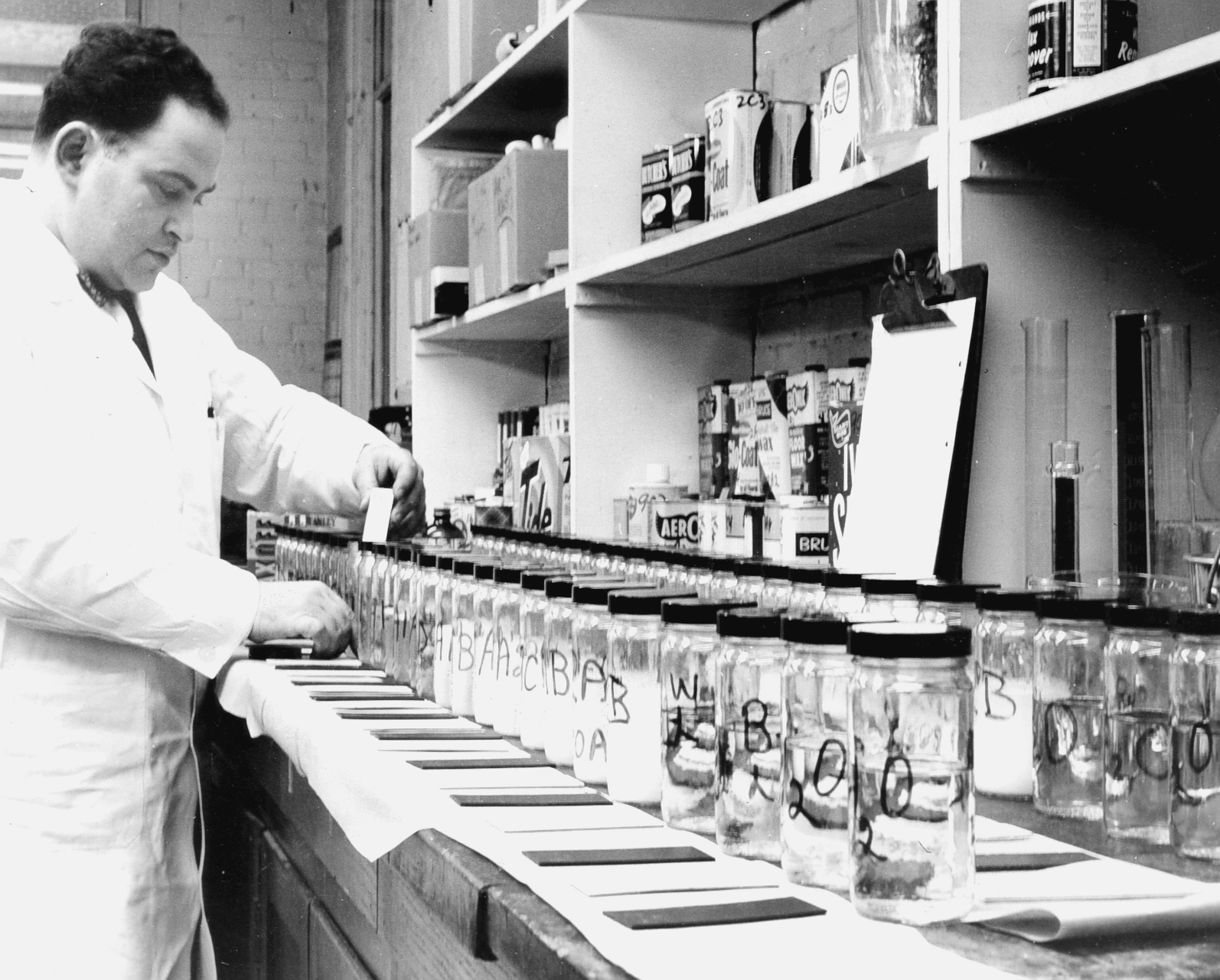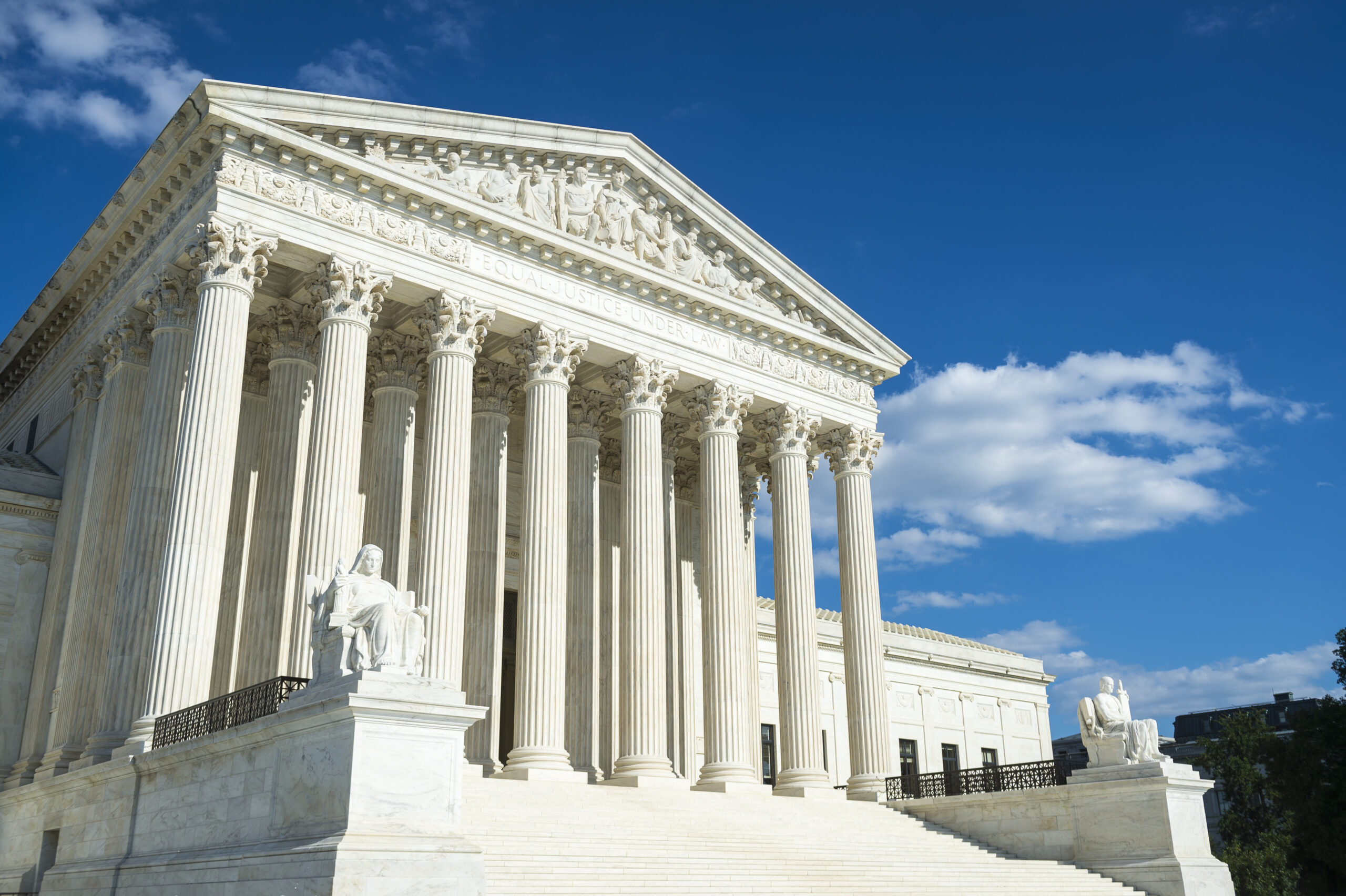
Advocates for a Fair and Just Marketplace
Consumer Reports is a trusted voice among millions of American consumers for safety, fairness, and honesty in the marketplace.
We’re independent, nonpartisan advocates who work with policymakers, consumers, and industry to keep products and services safe, reliable, and fairly priced.
Here's our story.
Get Involved

Be in the Know
Join our Consumer Impact Newsletter list to stay on top of the issues that matter most to consumers.
Sign up now
Here’s What We’re Working On
Download our Consumer Agenda to learn more about the issues we’re working on today.
Download
A Long History of Standing Up for American Consumers
Democratizing the marketplace is in our DNA. For 85 years, we’ve worked with American consumers securing important victories that have made their daily lives safer, healthier, and fairer.

1936
Founding Consumers Union
Striking workers left Consumers Research to form Consumers Union, now known as Consumer Reports (CR). CU was established to be an independent, nonprofit organization that works with consumers to create a fair and just marketplace, using testing, reporting, and advocacy to counter misinformation about products and services and advance consumer protections.
1937
Fighting Censorship at the Post Office
Consumer Reports (CR) published the “Report on Contraceptive Materials,” with distribution limited to married CR members who were using contraceptives on the advice of a physician. A practical patient’s guide to family planning, causes for infertility, and tests and treatment programs, the publication was banned by the U.S. Post Office. CR sued, and in a victory for the right to a free press, a U.S. appeals court overruled the ban in 1944.

1941
Guiding Consumers in Wartime
When the country went to war in 1941, manufacturers were focused mainly on war production, and many consumers had to adjust to rationing to make ends meet. Consumer Reports (CR) understood that reality and published a weekly newsletter called Bread and Butter—for just $1 per year—focused on making smart decisions with limited funds.

1958
Exposing the Consequences of Nuclear Fallout
Consumer Reports (CR) launched the first large-scale investigation of consumer exposure to fallout from nuclear weapons testing, analyzing the amount of Strontium-90 in store-bought milk. Our work prompted the federal government to expand its own monitoring of nuclear fallout and ultimately helped build public support for the 1963 Nuclear Test Ban Treaty.
1964
Warning About the Public Health Threat of Cigarettes
Consumer Reports (CR) led the first independent testing and research of cigarettes for over a decade. We aimed to separate the mythmaking of manufacturers and advertisers from the consumer realities and potential health risks of regular smoking. The Surgeon General’s Advisory Committee on Smoking and Health used CR’s work to draft its landmark report.

1968
U.S. Government Mandates Seat Belts
After more than 10 years of testing and advocacy by Consumer Reports (CR), the federal government mandates seat belts in cars. Before testing, two-thirds of seat belts failed to meet safety and efficacy guidelines. CR scientists traveled to Sweden to have the testing done at facilities with specialized equipment not available in the U.S. at the time.

1974
Fighting for Safer Drinking Water
Consumer Reports (CR) published a landmark three-part series on the safety of the United States water supply, which played a key role in encouraging Congress to pass the Safe Drinking Water Act.
1976
Keeping the Lead Out
Congress passed the Hazardous Products Act after Consumer Reports (CR) testified to limit the amount of lead used in house paint and children’s toys, furniture, and cribs.

1981
Setting New Standards for Child Safety Seats
Consumer Reports’ (CR) tests in the early 1970s showed the majority of car seats were ‘Not Acceptable’ in keeping children safe in our simulated head-on collision, leading to stricter standards requiring manufacturers to certify that their seats could pass a rigorous crash test.

1984
Supreme Court Rules for CR
In Consumers Union v Bose, Consumer Reports (CR)—then Consumers Union—won a landmark victory at the Supreme Court establishing an important First Amendment precedent that publishers continue to invoke today to protect their right to fairly criticize consumer products.
1991
Reclaiming Billions for Health Care
Consumer Reports (CR) reclaimed $3.3 billion for the public from private California insurance companies to secure pro-consumer policies and programs in health care, establishing funds for two of the largest foundations in the U.S. Our “Conversion Project” spread to 35 states and ultimately delivered $16 BILLION in endowments to establish pro-consumer foundations.

1999
Exposing the Dangers of Pesticides
In a first-of-its-kind study of U.S. Department of Agriculture data, Consumer Reports (CR) found pesticide levels in some fruits and vegetables were too high. Shortly after, one of the pesticides was banned for use on food crops commonly consumed by children.
2007
Championing Anti-Rollover Technology
Consume Reports (CR) spent 20 years fighting to protect consumers from vehicle rollovers until the government mandated electronic stability control for every vehicle—at the time, a feature we deemed the greatest automotive lifesaver since the seat belt, saving 10,000 lives per year.
2007
Protecting Consumers From Identity Theft
Consumer Reports (CR) helped enact credit security freeze laws in 39 states and the District of Columbia. These laws were based on model legislation drafted by CR and gave consumers the ability to prevent identity thieves from opening fraudulent accounts using stolen personal information. In 2007, the three major credit bureaus agreed to voluntarily extend this identity theft safeguard in the remaining eleven states.
2010
Supporting Creation of the Consumer Financial Protection Bureau (CFPB)
Following the 2008 financial crisis, Consumer Reports (CR) was a critical advocate for establishing the Consumer Financial Protection Bureau (CFPB), an independent agency responsible for protecting consumers in the financial marketplace. The CFPB has returned more than $12 billion to nearly 30 million consumers who were cheated by financial companies, helped resolve more than a million consumer complaints, and put a stop to a raft of harmful banking, credit card, mortgage, and student loan practices.

2010
Organizing for Health Care Reform
Consumer Reports (CR) first began advocating for health care reform in the 1930s and by the 2000s, we knew we needed people’s voices to get it done. CR launched the “Cover America” tour, outfitting a 32-foot RV, logging nearly 18,000 miles across 47 states collecting stories from thousands of people. Two days before the vote on the Affordable Care Act, our consumer activists stood with lawmakers in Washington, DC to rally support for the legislation.

2012
Promoting Better Fuel Economy Standards
Thanks to 27,000 consumer public comments and testimony submitted by Consumer Reports (CR), the U.S. Department of Transportation and the Environmental Protection Agency adopted new fuel-economy rules requiring vehicles to reach a combined fuel economy of 54.5 miles per gallon by 2025. These rules save consumers thousands of dollars on gasoline over the lifetime of a vehicle while also lowering oil consumption and reducing air pollution.

2014
A Win on Backup Cameras
After years of Consumer Reports (CR) advocating for standards to address the problem of blind zones behind cars and trucks, the U.S. Department of Transportation finally required backup cameras in all vehicles less than 10,000 pounds by 2018.
2015
Promoting Responsible Antibiotics Policies at Fast Food Chains
Consumer Reports (CR) joined with other consumer groups to rate the major chain restaurants on whether they had policies to restrict the overuse of antibiotics by their meat and poultry suppliers. By 2019, the groups’ annual ratings had helped spur most chains to serve chicken raised without medically important antibiotics and McDonald’s announced that it would curb the use of the drugs in their global beef supply.
2017
CR Finds Potential Discrimination Against Drivers in Minority Neighborhoods
Consumer Reports (CR) and ProPublica found that drivers living in predominantly minority urban neighborhoods are charged higher average premiums than drivers with similar safety records in white neighborhoods. The landmark study prompted California’s Insurance Commissioner to order Nationwide and USAA to review their rate filings to eliminate this price disparity.

2018
Advancing Laws to Protect Consumer Privacy
Consumer Reports (CR) helped advocate for the passage of the California Consumer Privacy Act, fought efforts to weaken the legislation from industry lobbyists, and mobilized CR members to call on legislators to enact privacy protections.

2019
Protecting Kids & Infants From Dangerous Products
Consumer Reports’ (CR) investigation into the safety of infant inclined sleepers linked to dozens of deaths led to the recall of over 5 million sleepers and a proposed ban. Following CR’s outreach, several retailers and online marketplaces said they would stop selling the sleepers ahead of any government action.
2019
Dialing Back Robocalls
Consumer Reports (CR) spent years working with consumers and Congress to curb the pestilence of automated phone calls, many of which are initiated by fraudsters. The bipartisan TRACED Act was signed into law in December 2019, ushering in powerful consumer protections.
2019
Congress Ends Hidden Cable and Satellite TV Fees
Pay-TV companies can’t get away with advertising a low price but then charging more in hidden fees under reforms that Consumer Reports (CR) championed and helped pass in Congress. CR testified before a Senate Committee that extra fees cost an average of $450 a year and mobilized public pressure to pass legislation requiring cable and satellite TV providers to disclose the total cost before consumers sign up for service.

2020
Limiting Arsenic in Infant Rice Cereals
Eight years after Consumer Reports (CR) first called attention to the dangerous presence of inorganic arsenic in infant rice cereals, the U.S. Food and Drug Administration issued guidance to limit the amount of arsenic allowed in such products. Multiple CR investigations found troubling levels of arsenic in some infant rice cereals and helped prod the agency to finally take action.
Working Together
Our team of issue experts provide nonpartisan, independent analysis, and policy recommendations for the most pressing consumer issues. Meet and connect with CR experts here.
